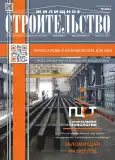Comparative assessment of requirements imposed on premises for the placement of high-precision production facilities
- Authors: Smirnov V.A.1
-
Affiliations:
- National Research Moscow State University of Civil Engineering
- Issue: No 10 (2024)
- Pages: 61-66
- Section: Articles
- URL: https://ter-arkhiv.ru/0044-4472/article/view/641760
- DOI: https://doi.org/10.31659/0044-4472-2024-10-61-66
- ID: 641760
Cite item
Abstract
The fundamental principles of design and criteria for the placement of high-precision equipment intended for the production of microelectronic components and the study of micron and submicron structures are considered.The main aspect of the article is focused on protection from vibration of natural and man-made origin, which is present in almost any construction site. The main goal of vibration minimization is to prevent the occurrence of oscillations that can distort measurement data and disrupt the operation of high-precision equipment, such as electron microscopes, lithographic installations and nanometer control systems. The modern requirement for vibration is the maximum permissible vibration velocity from 3 μm/s to 0.5μm/s or less, depending on the equipment and research purposes. The article analyzes the requirements of domestic and foreign regulatory and advisory documents for base vibration levels in places where high-precision equipment is installed. The results of measurements and assessment of vibration levels at a typical facility are presented in accordance with the specified requirements.
Full Text
About the authors
V. A. Smirnov
National Research Moscow State University of Civil Engineering
Author for correspondence.
Email: belohvost@list.ru
Candidate of Sciences (Engineering)
Russian Federation, 26, Yaroslavskoe Highway, Moscow, 129337References
- Zelensky A.A., Morozkin M.S., Gribkov A.A. Overview of the semiconductor industry in the world and Russia: production and equipment. Izvestiya vuzov. Electronics. 2021. No. 6, pp. 468–480. (In Russian). https:// doi.org/10.24151/1561-5405-2021-26-6-468-480
- Mondrus V.L., Smirnov V.A. Vibration protection of high-precision equipment from low-frequency vibrations. ACADEMIA. Architecture and construction. 2011. No. 1, pp. 109–111. (In Russian). EDN: OOEURP
- Smirnov V.A. Methods of placing high-precision equipment in existing buildings. Zhilishchnoe Stroitel’stvo [Housing Construction]. 2012. No. 6, pp. 76–77. EDN: PEMTJP
- Smirnov V.A., Savulidi M.Yu., Smolyakov M.Yu. Assessment of the impact of vibration on buildings and structures in the zone of influence of the railway. Zhilishchnoe Stroitel’stvo [Housing Construction]. 2022. No. 11, pp. 36–40. (In Russian). https:// doi.org/10.31659/0044-4472-2022-11-36-40
- Soueid A., Amick H., Zsirai T. Addressing the environmental challenges of the NIST Advanced Measurement Laboratory. Proceedings of SPIE – The International Society for Optical Engineering. 2005. 5933. https:// doi.org/10.1117/12.618915
- Amick H., Gendreau M., Wongprasert N. Centile spectra, measurement times, and statistics of ground vibration. Chapter in “Environmental Vibrations: Prediction, Monitoring, Mitigation and Evaluation”. CRC Press. 2005. 6 p. https://doi.org/10.1201/9781003209379
- Amick H., Gendreau M. Construction vibrations and their im-pact on vibration – sensitive facilities. ASCE Construction Congress 6 Orlando. Florida, February 22, 2000. 10 p.
- Michael Gendreau and Mei Wu. Environmental Noise Control for Semiconductor Manufacturing Facilities. Inter-Noise 99. The 1999 Congress and Exposition on Noise Control Engineering December 8, 1999. Fort Lauderdale, Florida.
- Amick H., Gendreau M., Gordon C. Facility Vibration Issues for Nanotechnology Research. Presented at the Symposium on Nano De-vice Technology 2002. National Chiao-Tung University, Hsinchu, Tai-wan.
- Generic Vibration Criteria for Vibration-Sensitive Equipment. Proceedings of International Society for Optical Engineering (SPIE) Conference on Current Developments in Vibration Control for Optomechanical Systems. Denver. CO. July 1999.
- Hal Amick, Ahmad Bayat. Meeting The Vibration Challenges Of Next-Generation Photolithography Tools. ESTECH 2001, 47th Annual Technical EST PMeeting. Ihoenix, Arizona, April 24, 2001. 10 p.







